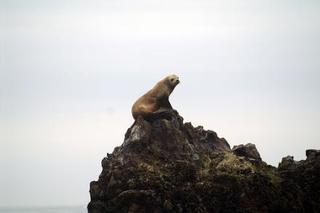NMFS holding ground on Steller sea lion plan

Thursday, October 07 2010
Unalaska, AK – An official from the National Marine Fisheries Service announced Wednesday that they would not be adopting the North Pacific Fishery Management Council's alternative plan for Steller sea lion management. The council had hoped that NMFS would consider relaxing the proposed restrictions and reducing the potential closures, but - with few exceptions - NMFS is moving ahead with the plan announced in August.
Effective January 1, NMFS will be closing Pacific cod and Atka mackerel fisheries in the western Aleutian Islands, in an effort to increase the food supply for the endangered western stock of sea lions. Doug DeMaster, a research director for NMFS, said that while area 543 at the end of the chain will definitely be closed, NMFS might be able to scale back closures in area 542, which includes Kiska and Amchitka. He says that while this is a difficult process with many stakeholders involved, adhering to the Endangered Species Act is the top priority.
"It affects fishermen. It affects communities. It's something the agency has not taken lightly," says DeMaster. "But the agency has a mandate under the Endangered Species Act, and it's try to fulfill that mandate."
Many representatives from the fishing industry are less than pleased. They estimate that the loss to the commercial fleet in the Western Aleutians is about $30 million, and that the brunt of that will fall on just about a dozen boats. David Benton is the executive director of the Marine Conservation Alliance, and industry group that has been critical of both the science behind the decision and the speed at which NMFS is operating. He's concerned that there wasn't enough time for the agency to review the Council's management plan - what they're calling a "reasonable and prudent alternative," or RPA.
"I think we're all disappointed that the agency didn't move in the way the Council indicated," says Benton. "I think that's in large part due to the very compressed time schedule that everyone was under."
Not everyone is disappointed though. Conservation groups are pleased that NMFS didn't weaken its plan. Michael Levine is Pacific senior counsel for the conservation group Oceana, and he says that the western stock of Steller sea lions are currently in a critical situation, and that their continued decline demands immediate attention.
"We are encouraged to learn that the National Marine Fisheries service is standing by its commitment to abide the endangered species act and move toward protecting the Western stock of Steller sea lions," says Levine.
The Council will be meeting through the end of the week, and will be discussing the prospect of a scientific review of the biological opinion.



